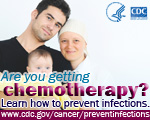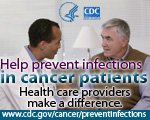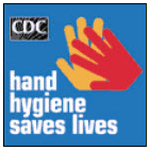El cáncer, la influenza y usted
What Cancer Patients, Survivors, and Caregivers Should Know About the Flu
Living with cancer increases your risk for complications from influenza ("flu"). If you have cancer now or have had cancer in the past, you are at higher risk for complications from the seasonal flu or influenza, including hospitalization and death.
To help prepare you for the flu this season, CDC answers some of your most important questions about special considerations for cancer patients, survivors, and caregivers for the flu.
- What should adult cancer patients and survivors know about this flu season?
- I had cancer in the past, but I do not have cancer now. ¿Es válida esta información para mi caso?
- Los pacientes con cáncer y los sobrevivientes, ¿tienen más probabilidades de contraer influenza que otras personas?
- Should cancer patients and survivors get a flu shot?
- What other vaccines should cancer patients and survivors be aware of?
- What can cancer patients and survivors do to reduce the spread of the flu?
- ¿Cuáles son los síntomas de la influenza?
- ¿Qué deben hacer los pacientes con cáncer y los sobrevivientes si creen que contrajeron influenza?
- I live with or provide care for a cancer patient or survivor. What do I need to know about the flu?
- ¿Existe algún tratamiento para la influenza?
- When should cancer patients and survivors be prescribed antiviral drugs to prevent the flu?
What should adult cancer patients and survivors know about this flu season?
"Flu" refers to illnesses caused by a number of different influenza viruses. Flu can cause a range of symptoms and effects, from mild to deadly. Algunas personas, incluso pacientes con cáncer y sobrevivientes, tienen más probabilidades de desarrollar complicaciones por la influenza que pueden llevar a la hospitalización y la muerte. For the latest information, visit 2012–2013 Flu Season.2012–2013 Flu Season.
I had cancer in the past, but I do not have cancer now. ¿Es válida esta información para mi caso?
Yes. If you had cancer in the past, you are at higher risk for complications from flu, even if you are free from cancer now.
Los pacientes con cáncer y los sobrevivientes, ¿tienen más probabilidades de contraer influenza que otras personas?
We do not know if cancer patients and survivors are at greater risk for infection with flu. However, we do know that cancer patients and survivors are at higher risk for complications from flu, including hospitalization and death.
Should cancer patients and survivors get a flu shot?
Yes. People with cancer or a history of cancer should receive the seasonal flu shot. People with cancer should NOT receive the nasal spray vaccine. The flu shot is made up of inactivated (killed) viruses, and the nasal spray vaccines are made up of live viruses. The flu shot is safer for those with a weakened immune system.
People who live with or care for cancer patients and survivors also should be vaccinated against seasonal flu.vaccinated against seasonal flu. Additionally, CDC recommends that everyone aged six months and older get a flu vaccine for the upcoming season.
This year, there are no separate vaccines for H1N1 and seasonal flu. Every year a different flu vaccine is developed to match the constantly changing flu strains that circle the globe. This year's vaccine is an all-in-one flu shot that protects against the swine flu strain (H1N1) plus two other kinds of influenza: an H3N2 virus and an influenza B virus. Getting a flu shot as soon as it becomes available each year is always a good idea, and the protection you get from vaccination will last throughout the flu season.
What other vaccines should cancer patients and survivors be aware of?
Many people in at-risk groups also should get a pneumococcal pneumonia shot. People with cancer or other diseases that compromise your immune system should ask their health care providers if two pneumococcal pneumonia shots are needed.
Fluzone de dosis alta is a new flu vaccine manufactured by Sanofi Pasteur Inc. specifically for people who are 65 years of age and older. Immune defenses become weaker with age, which places older people at greater risk of severe illness from flu. Also, aging decreases the body's ability to have a good immune response after getting a flu shot. A higher dose of antigen in the vaccine is supposed to give older people a better immune response and better protection against flu.
What can cancer patients and survivors do to help reduce the spread of the flu?
- Take time to get a flu vaccine.
- Desarrollar hábitos saludables to stop the spread of germs.
- Cúbrase la nariz y la boca con un pañuelo al toser o estornudar. Arroje el pañuelo a la basura luego de utilizarlo.
- Lávese las manos con agua y jabón frecuentemente. Si no dispone de agua y jabón, utilice un desinfectante para manos a base de alcohol.
- Evite tocarse los ojos, la nariz o la boca. Los gérmenes se diseminan de esta manera.
- Intente permanecer por lo menos a seis pies de distancia de quienes luzcan enfermos.
- Si contrajo una enfermedad similar a la influenza, stay home for at least 24 hours after your fever is gone excepto para recibir cuidados de salud o por necesidades de otro tipo. La fiebre debe desaparecer sin haber utilizado medicamentos antifebriles. Mantenga distancia de otras personas tanto como sea posible para evitar enfermarlas.
- Siga las recomendaciones sobre salud pública con respecto al cierre de escuelas, evitar multitudes y otras medidas de distanciamiento social.
- Por si llegara a enfermarse, tenga preparado un suministro de medicamentos de venta libre, desinfectante para manos a base de alcohol y pañuelos desechables.
- Tome medicamentos antivirales para la influenza if your doctor prescribes them.
Other important steps to take include—
- Manténgase informado al visitar CDC's Flu siteCDC's Flu site frecuentemente.
- Desarrolle un plan por adelantado con su médico sobre qué debe hacer en caso de enfermarse (cuándo debe llamar a su médico, si necesitará medicamentos antivirales y cómo obtener rápidamente una receta para comprar medicamentos antivirales de ser necesario).
- Make sure your vaccinations are up-to-date.
- Keep a written record of the type of cancer you have, treatment you have received and when you received it, the name and contact information for your doctor, and a list of medicines you are taking.
¿Cuáles son los síntomas de la influenza?
Los síntomas incluyen fiebre, tos, dolor de garganta, goteo o congestión nasal, dolores corporales, dolores de cabeza, escalofríos y fatiga. Algunas personas pueden presentar vómitos y diarrea. Las personas pueden contagiarse con el virus de la influenza y presentar síntomas respiratorios sin fiebre. Para más información, visite Síntomas de la influenza y gravedad.Síntomas de la influenza y gravedad.
¿Qué deben hacer los pacientes con cáncer y los sobrevivientes si creen que contrajeron influenza?
If you have received cancer treatment such as chemotherapy and/or radiation therapy within the last month, or have a blood or lymphatic form of cancer, call your doctor immediately if you get flu symptoms. Conozca cómo prevent infections while you're receiving chemotherapy.
Todos los pacientes con cáncer y los sobrevivientes deben seguir las medidas a continuación.
- Comuníquese con su proveedor de servicios de salud y siga sus instrucciones.
- Permanezca en su hogar y lejos de las personas lo más posible para impedir que se enfermen. This means you should avoid public activities, including work, school, travel, shopping, social events, and public gatherings. Debe stay home for at least 24 hours after your fever is gone (without the use of fever-reducing medicine), except to get medical care or other necessities.
- Si necesita ir al consultorio de su médico, a una sala de emergencia o a cualquier otro establecimiento de cuidados de salud, cúbrase la boca y la nariz con una mascarilla, si dispone de una y la tolera, o cúbrase la boca y la nariz con un papel desechable al toser o estornudar. Hágale saber al personal del establecimiento que está allí porque cree tener influenza.
Para más información, visite Seasonal Flu: What to Do If You Get Sick.
I live with or provide care for a cancer patient or survivor. What do I need to know about the flu?
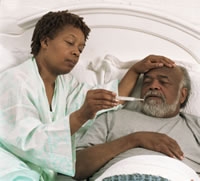
People with flu can spread it to others up to about six feet away. Most experts think that flu viruses are spread mainly by droplets made when people with flu cough, sneeze, or talk. These droplets can land in the mouths or noses of people who are nearby or be inhaled into their lungs. Siendo algo poco frecuente, una persona también puede llegar a contraer la influenza si toca una superficie o un objeto contaminado con el virus de la influenza y se toca luego la boca o la nariz.
Most healthy adults may be able to infect others beginning the day before symptoms develop and five to seven days after becoming sick. Esto quiere decir que usted puede contagiar la influenza a otra persona antes de saber que está enfermo y también mientras lo está. For more information, learn How Flu Spreads.How Flu Spreads.
Since cancer patients and survivors are at higher risk for complications from the flu, including hospitalization and death, please take the following precautions to help avoid spreading the flu.
- Get a flu shot. Los CDC le recomiendan la vacunación anual contra la influenza como el primer paso y el más importante para protegerse contra los virus de la influenza.
- Ayuda stop the spread of germs by covering your nose and mouth with a tissue when you cough or sneeze, washing your hands or using hand sanitizer often, avoiding close contact with sick people, and limiting contact with others as much as possible if you get sick.
If you are caring for a cancer patient or survivor who has the flu, please visit Influenza: Cuidar a una persona enferma en casa for detailed information about how to care for the sick person while avoiding getting sick yourself.
If you have a child with cancer, read Flu: A Guide for Parents of Children or Adolescents with Chronic Health Conditions [PDF-164KB].
¿Existe algún tratamiento para la influenza?

Yes. CDC recommends oseltamivir or zanamivir medicamentos antivirales to treat and prevent infection. Los medicamentos antivirales son medicamentos recetados (pastillas, líquidos o polvo de inhalación) que impiden que los virus de la influenza se multipliquen en su organismo. Si usted se enferma, los medicamentos antivirales pueden aliviar su enfermedad y hacer que se sienta mejor rápidamente. También pueden ayudar a prevenir complicaciones graves a causa de la influenza.
It's very important that antiviral drugs be used early to treat flu in people who are very sick with flu (for example, people who are in the hospital) and people who are sick with flu and have a greater chance of getting serious flu-related complications, including cancer patients and survivors.
¿Cuándo debería recetarse medicamentos antivirales a pacientes con cáncer y a sobrevivientes para prevenir la influenza?
If you have received cancer treatment such as chemotherapy and/or radiation therapy within the last month, or have a blood or lymphatic form of cancer, call your doctor immediately if you have been within six feet of someone known or suspected to have the flu. Su médico puede darle medicamentos antivirales para ayudar a prevenir la influenza.
Si usted tiene cáncer y no recibió tratamiento durante el último mes, o si tuvo cáncer en el pasado, pero ahora ya no lo padece y tuvo contacto cercano con alguien que sabe o sospecha que tiene influenza, comuníquese con su médico y consulte si debe recibir medicamentos antivirales.
Flu Publications

My health is my biggest asset [PDF-236KB]
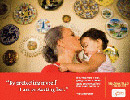
By protecting myself, I am protecting her [PDF-249KB]

¿Usted está en riesgo de tener complicaciones graves por la influenza? [PDF-274KB]

Shots aren't just for kids. [PDF-1MB]

What you should know about flu antiviral drugs [PDF-656KB]

Guide for Parents of Children with Chronic Health Conditions [PDF-164KB]
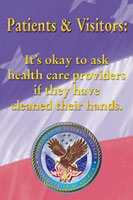

Contáctenos:
- Centros para el Control y la Prevención de Enfermedades
Division of Cancer Prevention and Control
4770 Buford Hwy NE
MS K-64
Atlanta, GA 30341 - 800-CDC-INFO
(800-232-4636)
TTY: (888) 232-6348 - Comuníquese con CDC-INFO








